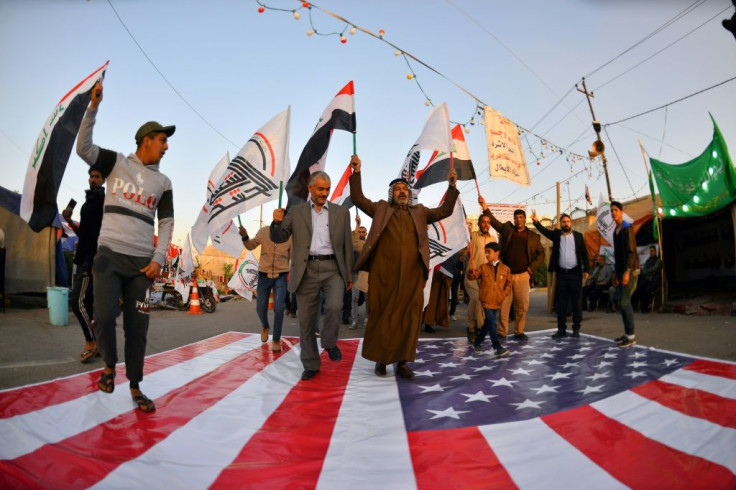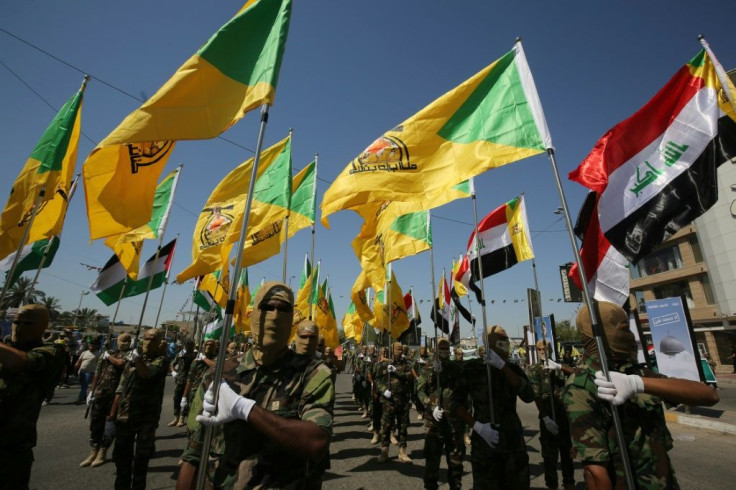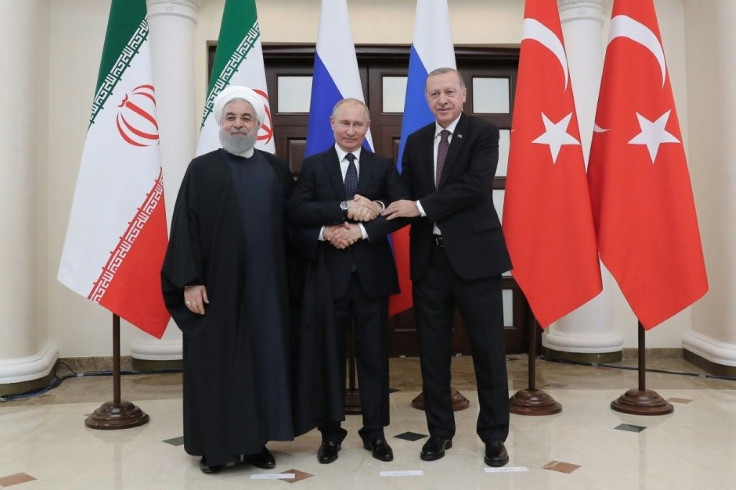US Troops In Mideast Are Unwelcome Guests Fighting For Freedoms That No One Wants

Countries from Iraq to Lebanon are in an uproar and the governments there are screaming to kick the U.S. military out of the area after precision airstrikes on an Iranian-backed militia's weapons caches. Thousands of protesters, allowed in through security checkpoints, attacked the U.S. embassy in Baghdad Tuesday.
There are some 5,000 troops still quartered in and around Baghdad. They are thereby invitation of the Iraqi government. There are thousands more U.S. troops in Iraq and Syria, fighting alongside regional allies to prevent a revival of the Islamic State in the region. But all that may change soon. Iraq’s National Security Council has indicated that it will have to review its cooperation with the U.S. as Iran's proxies stoke public anger against the United States.
That may be a good thing considering that the militia that attacked U.S. troops is also the same one that is tasked to protect them. It started Friday, Dec. 27, when the Iranian-backed Kataeb Hezbollah attacked a U.S. base near Kirkuk, killing an American contractor. The U.S. military responded with a defensive airstrike on five positions held by the militia. Three of those positions were located in Iraq, and two were located in Syria. The strikes killed 25 people and injured 55.
The fact is the U.S. may have no real allies here, except perhaps the Kurds. Those who hope democracy, aid money, and U.S. military muscle will bring peace to the Middle East are sadly out of touch with the reality of the region.
A Kurdish immigrant living in Fargo, North Dakota, who gave his name only as Falleh G, explained the situation recently: "Iran, Iraq, Syria are all the same. On the surface, they all plead for help when they need it, but under it all, they are the same. They all hate the West. Iran pulls the strings because of their nuclear energy and weapons. If you want to know the truth, they are all Iran."
The man now works as a mechanic in Fargo. "I came to America after the war in Iraq, where I served as an interpreter for the U.S. from 2003 to 2011 by doing this, I put my family in danger, all of them were killed except for my wife," Falleh G explained. "When my job was done I could not return home and survive so they let us come here in 2013."
But he was more than just an interpreter for the U.S. troops in Iraq. "Before the war [the Iraq war that started in 2003 with the U.S.-led invasion of Iraq], I would move weapons for them [the Iraqis] -- all types of chemical, biological and some unknown," he explained. "I am from Mosul and was forced to work for Saddam Hussein. I knew the country and my people lived on both sides of the border. They would give us money and freedom to move.
"I did this from 1995 to 2000. Then the U.N. came in looking for weapons, but by that point, they had all been traded or moved but they did exist. The only difference now is Saddam is dead -- like my family -- and Iran now has the attention of the world. The U.S. has given them martyrs to stir up the hate -- but they deserved it [the air strikes].
Iran funds several militias in the area and provides them with weapons and guidance; these proxy armies then strike U.S. and allied assets, and Iran gets to pretend like they know nothing. On the world stage, they cry about economic sanctions; behind closed doors, they wink and plot. The attack that elicited the American airstrikes was actually the eleventh such attack in the last two months.
"I only worry now that everyone will go to war," said Falleh. "Israel has always been a target for everyone. They are the little U.S., and Saddam and Iran have all launched weapons there and will again. It is very dangerous now, worse than before. All it will take is a few wrong words."
Though it may just be one man's story, it bodes true. Iran has attacked multiple targets with its proxy militias, infiltrated Iraq, and a large portion of the world with its Quds forces. The signs definitely point in a particular direction. But the court of public opinion always wants proof, usually, of the stockpile of weapons variety (Did anyone ever check Iran?). A little blood on the sand is never enough to sway the armchair generals of the world.
Sergeant John Teague, with the U.S. special forces in the region, says: "If the general public actually saw what we see, things would have been shut down a long time ago. The politicians here are just like anywhere else, talking heads full of hot air that only chase after money and power. We see what they are doing and will be ready for them when the time comes."
The fact is, there will never be a clear victor when a shooting war erupts. The killing will go on until the regional governments and proxies are left to their own devices.
Falleh makes a comment that is at once insightful and scary, "The idea of democracy there is stupid. Religion governs everything, fundamentally they all believe the same thing. I chose to come here and be free, and I love it. They will never accept democracy no matter how much money you give them."
"The only price they will accept is the blood of anyone who interferes. Don't believe Washington or anyone else that says the people want something different. Wanting some help getting rid of a ruthless leader is one thing, oh wait, ask Syria about that. nevermind that guy is still there, and so is Russia."

They love U.S. money but hate everything about the West? Perhaps pulling out the U.S. troops and actually applying sanctions might be the way to go. Bloodshed and violence can be necessary, but it sure seems like a waste when everywhere you turn your life is in danger, you don't know who the real enemy is, and people that are supposed to protect you fire rockets at you while you are eating. Blood on the sand? Let it be their own.
Most of the media ignore a significant screaming fact: Iran has been pulling strings and shaping the situation since 2016. Things were becoming relatively stable in Iraq when the U.S. pulled out of the nuclear deal with Iran, and then things started to go sideways. Political discontent turned into full-blown civil unrest in Iraq, resulting in the removal of its leadership -- a turmoil that the Iranians used to cover the fact that they were smuggling missiles into the country.

On one side the Iranians want sanctions lifted, and on the other, they allude to nuclear war. Iran has harassed the U.S. Navy on several occasions in international waters and reactivated its biggest reactor in an attempt to bully the U.S. with fear.
The U.S. military is growing weary of fighting the same wars. This has been going on for almost 20 years in Iraq. They will do whatever the President tells them to do but they are also ready to come home. Morale went up significantly when the drawdown was announced but that has dropped to a dull roar as things have begun to escalate.
(Benjamin Minick writes on military and defense and is an expert with several years of experience in Middle East policy and military tactics. The opinions expressed are the author's.)
© Copyright IBTimes 2025. All rights reserved.






















